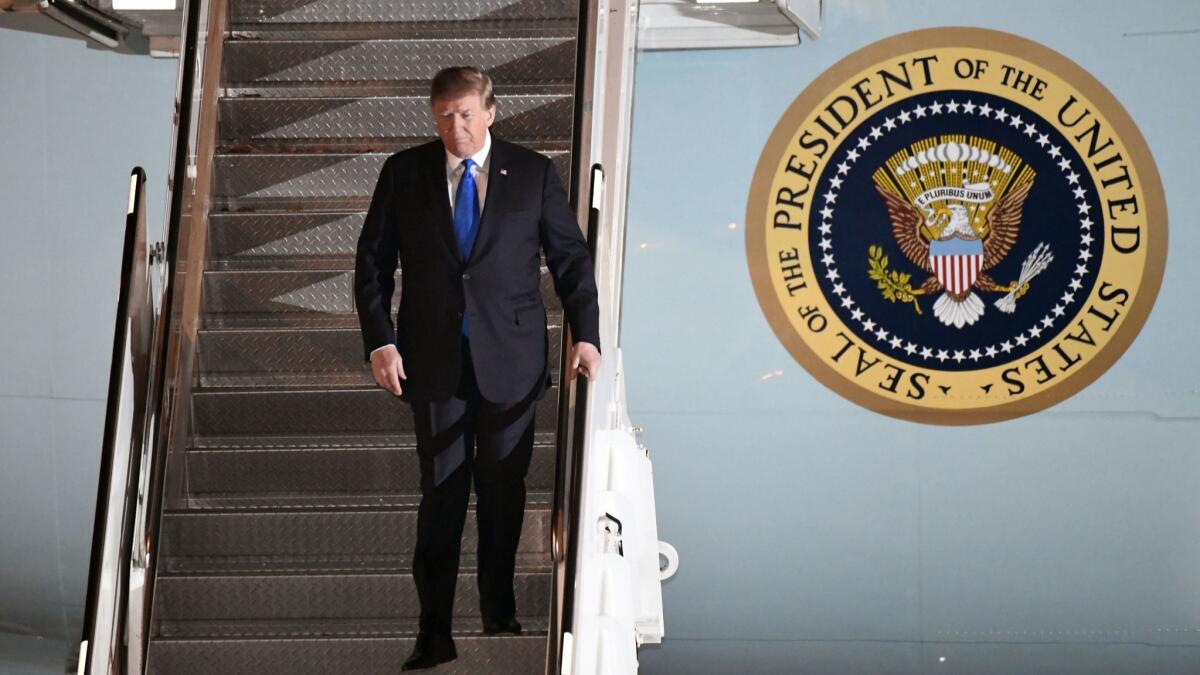Editorial: The Trump-Kim summit carries obvious risks but also possible rewards

As President Trump meets with North Korea’s Kim Jong Un in Vietnam, there are ample reasons for concern, a lot of them stemming from Trump’s failings as a leader and as a human being. But there is also reason for guarded optimism about the summit and the larger engagement between the United States and North Korea.
The president who likes to portray himself as a hardheaded deal-maker has proved distressingly susceptible to flattery from the dictator on whom he once threatened to rain “fire and fury.” It was hard not to cringe when Trump told a rally last year that Kim “wrote me beautiful letters — and they’re great letters. We fell in love.”
Trump also has absurdly exaggerated what his courtship of Kim has accomplished, tweeting inaccurately after their first meeting last June, “There is no longer a Nuclear Threat from North Korea,” and unloading on his intelligence advisors after they told Congress that “North Korea is unlikely to give up all of its nuclear weapons and production capabilities.”
As long as Trump’s actions in engaging North Korea are prudent and in the national interest, they deserve support.
Given Trump’s vanity and hunger for adulation, it’s reasonable to worry that he might impulsively make concessions that damage this country and our ally South Korea. Some fear that he might incautiously or precipitously commit the U.S. to withdrawing the 28,000 U.S. troops stationed in South Korea or reducing their number, although Trump said in a television interview this month that he has “no plans” to do so.
The apprehension is real, but it must be tempered by the fact that Trump’s closest advisors take a less sanguine view than he does of the nuclear threat still posed by North Korea. For example, Secretary of State Mike Pompeo on Sunday reinterpreted Trump’s boast about the elimination of the nuclear threat, saying Trump meant that the commitment Kim made at the last summit “may have substantially taken down the risk to the American people.”
It’s also important to recognize that the Trump-Kim negotiations are rooted not only in Trump’s longing for a diplomatic success, but also in South Koreans’ desire for a less antagonistic relationship with Pyongyang. South Korean President Moon Jae-in has made rapprochement with the North the signature policy of his administration.
Finally, it’s undeniable that tensions on the Korean peninsula have eased. Even the intelligence report that angered Trump acknowledged that “Pyongyang has not conducted any nuclear-capable missile or nuclear tests in more than a year, has declared its support for the denuclearization of the Korean Peninsula, and has reversibly dismantled portions of its WMD infrastructure.”
It makes sense for the United States, in concert with South Korea, to capitalize on this progress in the hopes that it will lead to the “final, fully verified denuclearization of North Korea” that remains the stated objective of the Trump administration. The question is whether the U.S. should offer incentives to the North without an ironclad commitment to denuclearization by Kim.
Enter the Fray: First takes on the news of the minute »
Trump has apparently decided on such an incremental approach. The president is considering agreeing as part of the summit to declare a formal conclusion to the Korean War, which ended in 1953 with a cease-fire but no peace treaty. Such a gesture would accommodate a long-standing North Korean demand, but the idea also has support in South Korea. South Korean Foreign Minister Kang Kyung-wha has suggested that a declaration would give the North a “sense of safety” that would make it likelier to denuclearize.
Precipitously withdrawing U.S. troops from South Korea or relaxing economic sanctions without an agreement by the North to place additional limits on its nuclear weapons program would be a mistake. But if a peace declaration would induce North Korea to make further concessions and ease tensions on the Korean peninsula, it would be justified.
We would be more comfortable if someone other than Trump were leading the U.S. delegation in Hanoi. But this country has only one president at a time. It’s probably too much to expect Trump to be careful in what he says about this or any other subject. But as long as his actions in engaging North Korea are prudent and in the national interest, they deserve support.
Follow the Opinion section on Twitter @latimesopinionand Facebook
More to Read
A cure for the common opinion
Get thought-provoking perspectives with our weekly newsletter.
You may occasionally receive promotional content from the Los Angeles Times.










